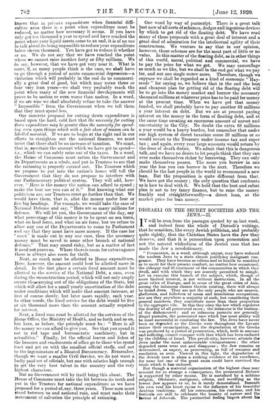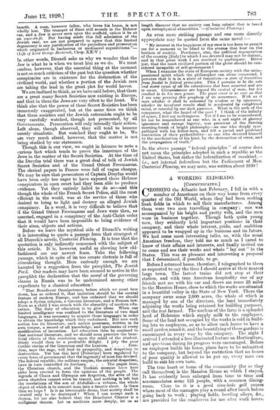DISRAELI ON THE SECRET SOCIETIES AND THE JEWS.—II.
IT will be seen from the passages quoted by us last week, 1- and indeed from the whole of Disraeli's writings, that he considers, like every Jewish politician, and probably quite rightly, that the Christian States have the Jew they deserve, and that it is persecution upon persecution and not the natural wickedness of the Jewish race that has made the Jew a revolutionary.
" Persecution, in a word, although unjust, may have reduced the modern Jews to a state almost justifying malignant ven- geance. They have become so odious and so hostile to mankind as to merit for •their present conduct, no matter how occasioned, the obloquy and ill-treatment of the communities in which they dwell, , and with which they are scarcely permitted to mingle. Let us examine this branch of the subject, which, though of more limited interest, is not without instruction. In all the great cities of Europe, and in some of the great cities of Asia, among the infamous classes therein existing, there will always be found Jews. They are not the only people who are usurers, gladiators, and followers of mean and scandalous occupations, nor are they anywhere a majority of such, but considering their general numbers, they contribute more than their proportion to the aggregate vile. In this they obey the law which regulates the destiny of all persecuted rams ; the infamous is the businea; of the dishonoured ; and as infamous pursuits are generally illegal pursuits, the persecuted race which has moat ability will be most successful in combating the law. The Jews have never been so degraded as the Greeks were throughout the Levant before their emancipation, and the degradation of the Greeks was produced by a period of persecution, which, both in amount and suffering, cannot compare with that which has been endured by the children of Israel. This peculiarity, however, attends the Jews under the most unfavourable circumstances : the other degraded races wear out and disappear ; the Jew remains as determined, as expert, as persevering, as full of resource and resolution as ever. Viewed in this light, the degradation of the Jewish race is alone a striking evidence of its excellence,
for none but one of the at races could have survived the trials which it has endured.
But though a material organization of the highest class may account for so strange a consequence, the persecuted Hebrew is supported hy other means. He is sustained by a sublime religion. Obdurate, malignant, odious, and revolting as the lowest Jew appears to us, he is rarely demoralized. Beneath his own roof his heart opens to the influence of his beautiful Arabian traditions. All his ceremonies, his customs, and his festivals are still to celebrate the bounty of nature and the favour of Jehovah. The patriarchal feeling lingers about his hearth. A man, however fallen, who loves his home, is not wholly lost. The trumpet of Sinai still sounds in the Hebrew ear, and a Jew is never seen upon the scaffold, unless it be at an auto-dale. But having made this full admission of the Jewish race, we are not prepared to agree that this limited degeneracy is any justification of the prejudices and persecution which originated in barbarous or mediaeval superstitions."— (Life of Lord George Bentitick, Chap. XXIX ) hi other words, Disraeli asks us why we wonder that the Jew is what he is when we treat him as we do. We must confess, however, that the essential thing at the moment is not so much criticism of the past but the question whether conspiracies are in existenoe for the destruction of the civilized world, and whether a portion of the Jewish race are taking the lead in the great plot for world havoc. We are Inclined to think, as we have said before, that there are a great many Secret Societies now existing in Europe, and that in them the Jews are very often to the front. We think also that the power of these Secret Societies has been immensely exaggerated, but at the same time we think that these societies and the Jewish extremists ought to be very carefully watched, though not persecuted, by all Governments. Persecution will only intensify their action. Left alone, though observed, they will tend to become merely ritualistic. But watched they ought to be. We are very much afraid, however, that the matter is not being studied by our statesmen. Though: this is our view, we ought in fairness to note a curious fact which tends to prove the innocence of the Jews in the matter of the Secret Societies. At the time of the Dreyfus trial there was a great deal of talk of Jewish Secret Societies and of the Grand Orient Freemasons. The clerical papers in France were full of vague charges. We may be sure that persecutors of Captain Dreyfus would have been only too eager to have exposed these Hebrew conspirators in open court had they been able to produce evidence. Yet they entirely failed to do so—and this though the whole of the French Secret Police, still the most efficient in the world, was at the service of those who desired to bring to light and destroy an alleged Jewish conspiracy. In a word, it is very difficult to believe that if the Grand Orient Freemasons and Jews were then, as asserted, engaged. in a conspiracy of the Anti-Christ order that it would have been, impossible to bring evidence of their aims, objects and actions. Before we leave the mystical side of Disraeli's. writing it is interesting to quote a passage from that strangest of all Disraeli's novels, Contarini Fleming. It is true that the quotation is only indirectly concerned, with the subject of this article. It is, however, useful as showing how old- fashioned are our newest fears.. Take the following passage, which in spite of its too ornate rhetoric is full of stimulating thought. Here curiously enough we are haunted by a suggestion from the pamphlet, The Jewish Peril. Our readers may have been amused to notice in the pamphlet the declaration that the moral of the governing classes in Russia was to be undermined among other expedients by a classical education !
" That Beneficent Omnipotence, before which we must bow down, has so ordered it, that imitation should be the mental feature of modern Europe, and has ordained that we should adopt a Syrian religion, a Grecian literature, and a Roman law. Even as a.child I was struck with the absurdity of modem edu- cation. The duty of education is to give ideas. When our limited intelligence was confined to the literature of two dead languages, it was necessary to acquire those languages in order to obtain the knowledge which they embalmed. But now each nation has its literature, each nation possesses; written in its own tongue, a record of all knowledge, and specimens. of every modification of invention. Let education then be confined to that national literature, and we should soon perceive the bene- ficial effects of this resolution upon the mind of the student. Study would then be a profitable delight. I pity the poor Gothic victim of the Grammar and the Lexicon. . . . Free- dom, says the sage, will lead to prosperity, and despotism to destruction. Yet has this lard [Palestine] been regulated by every form of government that the ingenuity of man has devised. The federal republic, the military empire, the oriental despotism, have in turn controlled its fortunes. . . . The pagan fans, the Christian church, and the Turkish mosque have here alike been erected to form the opinions of the people. The legends of Chaos and Olympus are forgotten, the sites of the seven churches cannot even be traced, and nothing is left but the revelations of the son of Abdullah—a volume, the whole object of which is to convert man into a fanatic slave. Is there then no hope ? Is it an irrevocable doom, that society shall be created only to be destroyed ? When I can accept such a dogma, let me also believe that the Beneficent Creator is a malignant demon. Let us meditate more deeply, let us at length discover that no society can long subsist that is based upon metaphysical absurdities. '—(Contarini Fleming.) An even more striking passage and one more directly appropriate may be quoted from the same novel :- " My interest in the happiness of my race is too keen to permit me for a moment to be blind to the storms that lour on- the- horizon of society. Perchance, also, the political regeneration of the country [Italy] to which I am devoted may not be distant, and in that great work I am resolved to participate. Bitter jest, that the most civilized portion of the globe should be con- sidered incapable of self-government When I examine the state of European society with the unim. passioned spirit which the philosopher can alone command, I perceive that it is in a state of transition—a state of transition from feudal to federal principles. This I perceive to be the sole and secret cause of all the convulsions that have occurred and are to occur. Circumstances are beyond the control of man, but his conduct is in his own power. Thereat event is as sure as that I am now penning this prophecy of its occurrence. With us it rests whether it shall be welcomed by wisdom or by ignorance, whether its beneficent results shall be accelerated by enlightened mind, or retarded by our dark passions. What is the arch of the conqueror, what the laurel of the poet ? I think of the infinity of space, I feel my nothingness. Yet if I am to be remembered, let me be remembered as one who, in a sad night of gloomy ignorance and savage bigotry, was prescient of the flaming morning-break of bright philosophy—as one who deeply sym- pathized with his fellow-men, and felt a proud and profound conviction of their perfectibility—as one who devoted himself to the amelioration of his kind, by the destruction of error, and the propagation of truth," In the above passage " federal principles " of course does not mean the principles adopted in such a republic as the United States, but rather the federalization of mankind ,— i.e., not internal federalism but the Parliament of Man. Contarini Fleming, we may note, was written about 1830!







































 Previous page
Previous page